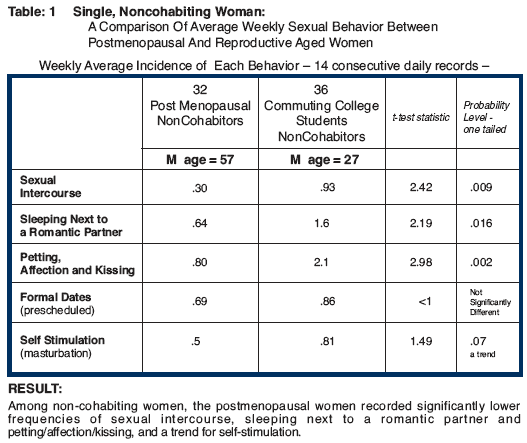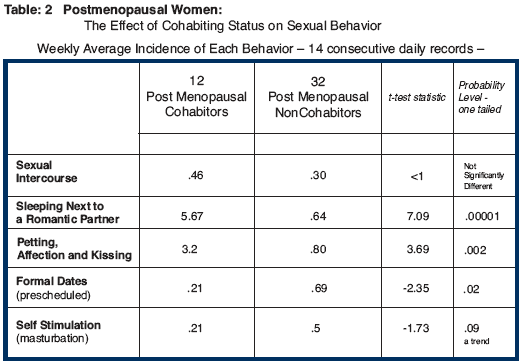Sociosexual behavior of two groups of healthy women has recently been examined using daily behavioral calendars. These placebo-controlled studies tested the influence of synthesized pheromone fragrance additives on sexual intercourse, sleeping next to a romantic partner, petting/affection/kissing, masturbation, and formal prescheduled dates.
For this report, we analyzed the baseline records only from these 2 studies (recorded before the experimental period began). Results showed comparative decrements in postmenopausal women that are new to the literature.
Subjects/Methods: 36 non-cohabiting San Francisco women Mage=27 commuting to college1 and 44 (32 non-cohabiting) highly educated postmenopausal women in Boston2 M age=57. All wanted "to increase the romance in their lives" and provided >2 weeks of daily baseline records transmitted weekly to researchers prior to the experimental phase. Average weekly frequency of each sociosexual behavior was compared between groups using t-tests.
Results: Among non-cohabiting subjects, the younger group recorded more sexual intercourse (p<. 01), sleeping next to a romantic partner (p<.02), petting/kissing/affection (p<.01), and masturbation (p<.07) than the postmenopausal group but no differences in frequency of formal dates. Among postmenopausal subjects, there were no significant differences in sexual intercourse, between cohabiting and non-cohabiting women but cohabiting subjects did record more sleeping next to a romantic partner (p<.01), petting/affection/kissing (p<.01), and fewer formal dates (p<.02] than non cohabiting subjects. Masturbation was not significantly different for the 2 age groups of non-cohabiting women but among postmenopausal subjects there was a trend for lower frequency (p=.09) among women who were cohabiting and a similar trend (p=.07) for lower frequency in older vs. younger noncohabitors.
Conclusion: Among postmenopausal women, those cohabiting recorded a significantly higher frequency of intimate sociosexual behavior than those non-cohabiting. Compared to younger non-cohabiting women, non-cohabiting postmenopausal women experienced less petting/kissing/ affection, sleeping with a partner, and sexual intercourse.
Because affectionate romantic contact increases well being, and many postmenopausal women are not cohabiting, these deficiencies should be considered by practitioners in the context of wellness.


